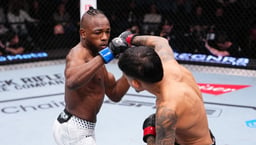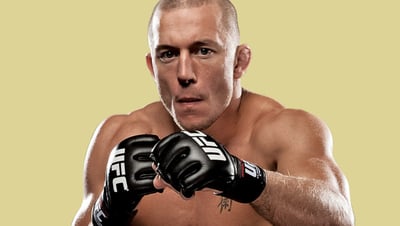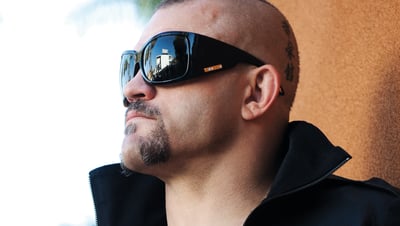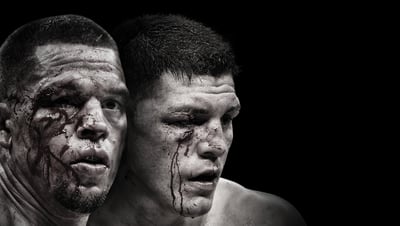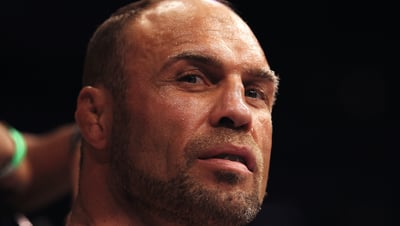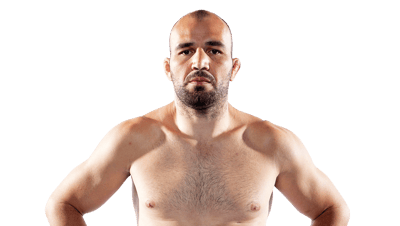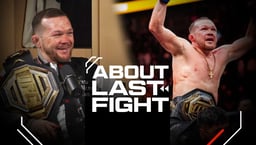
Issue 210
September 2024
Alongside his role as head of fighter operations for the PFL, former UFC welterweight contender Dan Hardy is one of the most respected voices in MMA commentary. His sharp analysis and deep understanding of the fight game have earned him a reputation as one of the greatest minds in combat sports. Fighters Only’s Paul Browne caught up with 'The Outlaw' to discuss the challenges his role on the commentary desk can bring.
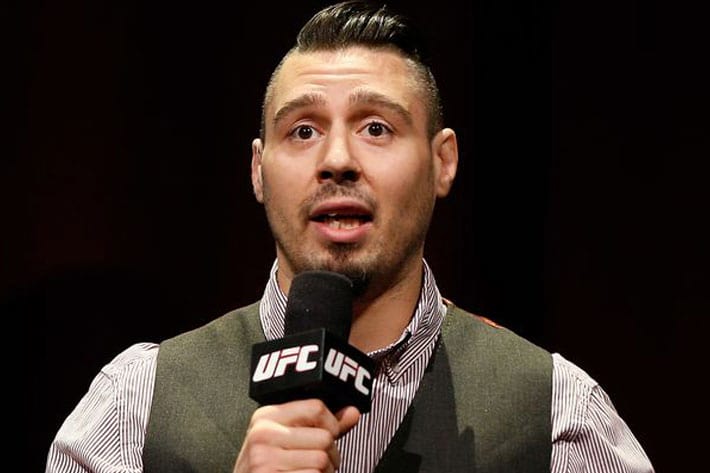
How does it feel to be nominated once again for the Fighters Only Analyst of the Year Award?
I’m always honored to be nominated. The group of people that I’m amongst is the best of the best when it comes to the minds of mixed martial arts. Just to be among those names is a real honor. I actually feel like I’ve lost a bit of momentum recently because I’m not doing as many breakdowns as I was before, but really the analysis is my main passion when it comes to MMA. So, to be recognized for my knowledge of the sport is a real honor.
Tell us about your transition towards commentary once your career as a fighter ended.
It was a bit of a weird one, to be honest. I’d had my fight (against Matt Brown in 2013) postponed/canceled when I was fighting in California, and I was calling into the old UFC offices on Sahara in Las Vegas. I was actually calling in to meet with Lorenzo Fertitta. He always checked in on me. I was one of the fighters that he always enjoyed watching, so when I stopped fighting, he would always check in on me. He called me into the office a couple of times just to see where I was and what I was doing. On this particular day, I sat with him for about 20-30 minutes, and he was saying, ‘You need to talk to Dana (White). He’s got something that he’d like you to think about.’ I was kind of at a loose end. I didn’t know what I wanted to do, and as I was walking out of the offices, a big stretch Hummer pulled up, and Dana got out of it. He came right up to me and said, ‘I’ve got something for you. I want you to move back to the UK. I want you to commentate for the UFC!’
It completely came out of nowhere. I asked if they wanted me to do any type of training for it, he said, ‘No, just go there, just do it your way, just be yourself.’ So that was how I fell into it. My first event was UFC London, and off the back of that, we developed Inside the Octagon and the breakdown show and a few other things, too. I was discovering skills that I didn’t really know that I had when I first started doing it.
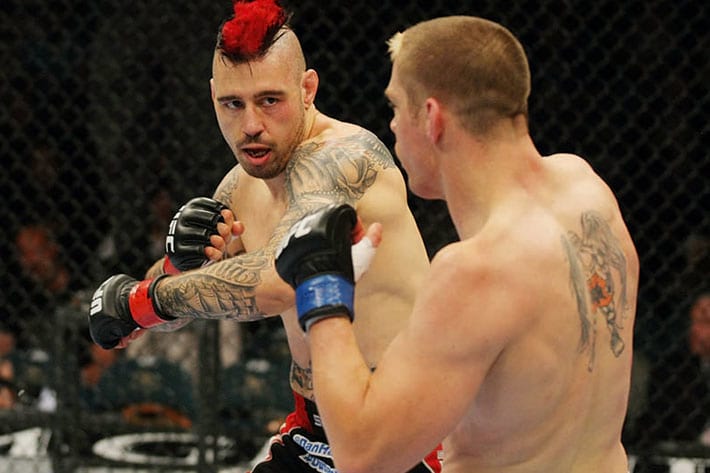
What’s the most memorable fight you’ve ever called and why?
I would say there’s two or three. Conor McGregor v Diego Brandao (in Dublin in 2014) is always my go-to answer. That was more about the atmosphere, the crowd, and the moment for Conor McGregor than the actual fight itself because McGregor just completely smashed him. The other ones that spring to mind? Michael Bisping v Anderson Silva at the 02 Arena (in 2016) will always be one of the fights that, when I think of commentating, I’m there at the side of the cage for that fight.
And one other one is my final fight for the UFC in 2021 which was Max Holloway v Calvin Kattar. The only reason why that falls behind the Bisping/Silva one is because it probably could have done with being stopped at the end of the fourth round because Calvin Kattar was pretty battered by that point. Whereas the Michael Bisping fight was very up-and-down, the mad flying knee and then Anderson Silva sitting on the side of the cage thinking he’s won, the big adrenaline dump, and then Bisping coming back with a smashed-in face to win a decision. For me, that event, being at the 02 Arena, which is familiar for me, and seeing Bisping fighting a legend like Anderson Silva at the time and coming out on top was a very special moment.
When commentating at an event, what is your preparation process?
I used to begin at the bottom of the card and work my way up, but what I’ve found is that we have more fights fall out at the bottom of the card. So now I start at the top and work down. And I start as early in the fighter’s career as I can. I’ll start with the blue corner. I’ll find their earliest fight, and I’ll watch as many of their fights as I can. With the PFL broadcast, we also put together a ‘keys to victory’ segment for each fighter, which has become part of my process now. So, I’ll start by watching their fights and writing down as many ‘keys to victory’ as I can for that person. Then I’ll switch over to their opponent, and I’ll do the same thing. I’ll go through all of their fights chronologically and go through all the ‘keys to victory,’ and then I’ll sit and think, ‘Which keys to victory are gonna be suitable in this particular fight for this particular opponent?’ Then, I’ll put those keys to victory in place and move on to the next fight. I try and get through as many fights as I can, and I try to do it as chronologically as possible.
How do you stay impartial during a broadcast?
It’s never something I have to consciously try to do. I have a great amount of respect for both people in the cage because I know what they’ve sacrificed to get in there. So, by me calling a fight in one direction or another is just completely disrespectful to one of the fighters. It can be difficult, and the other challenge is, and I learned this when I called Paul Felder v Dan Hooker, I was told from both camps that I was being biased toward the other team. It’s weird because the fight does shift back and forth. Felder had a rough first round, Hooker had a rough second round, and you have to state what people don’t want to hear sometimes.
Bias is a perspective. From my perspective, I’m giving everybody a fair shout and I’m reading it exactly how I see it in that moment. And that’s purely based on the fact that I know what they’ve sacrificed to get in there, and I know how much it means to everybody involved. I’m just there to observe and commentate and to add any kind of influence to it would be unfair.

How do you deal with criticism from the MMA community?
It helps that my first reaction is generally to be forgiving to the person because they’re in a heightened state of emotion. They’re watching someone that they care tremendously about, and they’re hearing someone say something about that person that they don’t wanna hear. Sometimes, you’ll get a very strong emotional reaction out of someone on the day of the fight or on the day after. I had a professional rugby player really coming after me after the Dan Hooker v Paul Felder fight because he was saying I was so biased towards Paul Felder because he is my friend and sits next to me on the commentary desk. But it’s just not the way that my brain works. So, to hear that was kind of odd, but then the next day, he messaged me and said, ‘Hey man, I’m sorry. I was at a party, it was full of Dan Hooker fans, we were all so invested.’ So, I always look at the fan and realize there’s a lot of emotion coming through here, you know?
And the other thing is that I’m always honest with myself and realize that what someone would say on social media is not what they would say in person. Someone lashing out on social media is showing me a very small part of their personality that’s quite ugly, and in actuality, if I met that person, they probably wouldn’t show me that part of their character. Social media is somewhat of a black hole for people to throw their toxicity into, and I tend to just kind of tune it out better now, I don’t take it to heart nearly as much.
How do you balance technical insights for seasoned MMA fans while keeping it accessible for newcomers?
That really is a challenge because we have a lot of fans that don’t really understand exactly what’s going on in certain ranges of the fight. And then you have other people who will correct me, saying, ‘No, that’s not that particular move.’ So, I have to make sure that my knowledge is on point, and I also have to make sure that I can make my knowledge easier to understand. If I’m explaining a choking position, I’ve got to explain how the choke works mechanically, and I’m explaining that to someone who probably knows that choke because they can do it. But if I’m not breaking it down on a simplistic enough level, then the viewer who doesn’t train doesn’t understand things like where exactly the leverage is coming from because they’ve never felt it. So, I have to try and find that balance by having the elite-level knowledge that I know the elite-level viewers are going to want to hear, but at the same time providing that elite-level knowledge in a way that is in layman’s terms.
I don’t use Japanese terminology, for example. I know a lot of commentators do that, which I don’t mind. It’s paying their respects to the traditional styles. But I could say ‘Harai Goshi,’ and you might know what that means, but if I say it in commentary, probably 5% of the viewers will understand what I’m talking about. So, I’m actually excluding a big portion of the audience by trying to be too nuanced, and I think sometimes you can take that too far. It’s actually quite interesting when you watch Japanese MMA you’ll hear an occasional English phrase, like ‘Lucky punch.’ I hear that quite a lot when I’m listening to Japanese or Russian commentary. It happens in all different languages. I try not to dumb it down but to just make it more accessible for the entire audience.
It’s easier now that the fanbase is much more knowledgeable than it was. That was part of the motivation for creating Inside the Octagon. There is a need to get as much information out to the fanbase so that they could appreciate what’s going on a lot more. I still think we need a lot more of that type of content. I know there are a couple of other shows along those lines, but since Inside the Octagon has gone away there’s not that mainstay breakdown show that’s there for every major event anymore.
How do you maintain your voice and energy levels while commentating on events?
Hydration is a big key. Not having too many snacks, too, I always find that’s a bit of a trap that people can fall into on fight day - having loads of snacks around the desk to keep their energy up. Having a few energy drinks, but then your energy levels are up and down. I like to try and let my energy build as the event goes on. I keep a slow, steady drip of coffee going throughout the day on event day, but I try not to consume anything that will give me large spikes in energy. I allow myself to be a fan and enjoy the fights, but more so in the main card than the undercard. I don’t want to get too carried away and lose my voice before the co-main and main event. That’s where I’ll really need my pipes, and don’t want them dying out early. That was a learning experience for sure, and I still hear Daniel Cormier struggling with that from time to time. He’ll start off the show at 100 miles per hour, and by the end of the main card, you’ll hear his voice beginning to scratch and struggle. That comes with experience, I think.
How has the fan interaction changed for you with the rise of social media?
My interaction with fans has always been pretty good, to be honest. Even in my fighting days when it was all My Space, then Facebook, then Twitter was really the big turning point. That was when I really started to be able to engage with the fans on a daily basis. I really enjoyed Twitter back in the day when it was a lot busier - a lot more conversational. Ultimately, I think my transition into commentary came at a good time. I was generally more accessible to fans anyway. When I was fighting, I was in the limelight three times a year, and they would see me occasionally between that doing whatever else, but when I started commentating doing the analysis, I was on their screen almost every week. So, I was more accessible anyway, which meant there were less peaks and troughs in my social media.
I have kind of a general interaction now with fans and followers. Just the fact that they can tweet me and I’ll reply, or they’ll tag me on Instagram, and I’ll share it. I’ve always enjoyed that close interaction with the fans, and I think given the fact that I didn’t come from football where you have to keep your distance from the fans because they’re obsessive and wild, but it’s different in MMA in that we’re far closer to the fans, mainly because most of us really just ARE fans who happen to also fight. I enjoy social media. It takes some managing, but at the same time, the accessibility to the fans makes them really appreciate the time that you put into the sport.
What advice would you give to aspiring MMA commentators?
Get experience where you can. Most likely, that experience is going to be on amateur shows, on local shows. If it’s kickboxing or grappling, it doesn’t really matter. Whatever you can do to get yourself at a table with a microphone while live action is going on, then just get that experience. Even if it’s different sports. I think you can benefit generally from getting to understand how broadcasts work. A lot of the adaptation and development that I had to do was not learning how to talk and what to say, it was about how to be a part of the broadcast. How to get used to people talking in my ears while I’m trying to think. Going from one mic to another and making sure that you know how to work all the mechanical stuff like the talkback button. Little things like that can really feel quite daunting in the early days. The more practice you get at that, the more it becomes part of your routine. Now, you’ll see me at shows going from commentary to cage interviews, to running over to the DJ, and loads of other things going on around me. I can be all over the place, and part of my comfort in that madness is knowing my equipment and the system that I’m working within, if that makes sense.
Looking back on your career as a commentator, what would you say has been the key to your success?
I think diligence. My willingness to get up every day and put the work in, not thinking that I can show up every day and do the job because of my experience and because of the knowledge that I’ve got. I look at every single fight card and breakdown as an opportunity to learn something new about people. I remember my very first commentary gig. All of a sudden, I’m sitting cage side. The crowd is starting to trickle in. I felt like I was 14 years old and waiting for someone to come and tap me on the shoulder and ask me what the hell I was doing in that seat. From that point onwards, I’ve always had that little bit of an imposter syndrome, which has kept me grounded and made me think, ‘I better do the work because someone might realize I’m not actually very good at this.’ And I honestly think that’s been the main key to my success. And that means that when I wake up in the morning, my first thought is, ‘Right, what fights am I watching today? What training am I doing today? What fight am I focused on? What event is coming up? And my mindset is always focused on how I can be better at the job that I’m doing.
Hardy’s ability to break down fights with clarity while capturing the excitement of the sport has enriched the viewing experience for fans worldwide. Whether calling the action from the cage side or providing post-fight analysis, Hardy’s voice has become as iconic as his fighting career, solidifying his place as a vital ambassador for the sport of mixed martial arts.


